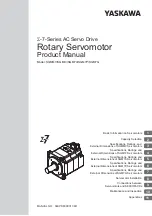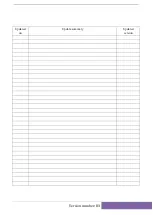
24
Assembly Instruction
KS 15 S12 24V DC
M
AINTENANCE
AND
R
EPAIR
Problem
Possible causes
Possible solutions
Drive does not
start
• Duration of mains
power supply too short
• Drive run direction not
correct
• Connecting cable not
connected
• Power supply / Control
Unit voltage incorrect,
too high or too low (see
data sheet)
• No mains supply to
power supply unit /
Control Unit
(no voltage)
• Drive has shut down
on overload
• Adjust supply voltage
as specifi ed in the
technical documen-
tation
• Check drive cables
• Check all connection
cables
• Check power supply unit
and replace if necessary
• Connect power supply
• First move drive in
CLOSE position
Drive doesn‘t
start after
having been
in operation
several times
• Operating time has been
exceeded, drive has
been overheated
• See possible solutions
above associated with
„Drive doesn‘t start“
• Wait until drive has
cooled down and start
again
• See possible solutions
associated with:
“Drive doesn‘t start“
Drive doesn‘t
close
• Closing edge safety
mechanism has been
triggered
• See possible solutions
above associated with
„Drive doesn‘t start“
• Release safety area for
operation and reset
closing edge safety
mechanism
• See possible solutions
associated with:
“Drive doesn‘t start”
Drive travels
uncontrolled in
open and close
direction
• Residual ripple of power
supply / control unit too
hight
• Fault in power supply
unit / control unit
• Adjust drive voltage to
the required value of
drive. (values see data
sheet of drive)
• Check output voltage of
power supply unit or
control unit
Drive closes,
but after about
10 mm the drive
open
• Close the window out-
side the 40 mm
(Soft run mode).
• Drive mounted so, that
the closing process
takes place within the
40 mm (e.g. use spacer
under the casement
bracket).
H
ELP
IN
CASE
OF
M
ALFUNCTIONS
, R
EPAIRS
AND
M
AINTENANCE
Professional repair of a defect drive can only be performed at the
manufacturer’s factory or manufacturer-certifi ed specialist company.
Unauthorized opening or manipulation of the drive terminates warranty.
1. Exchange defect drives or have them repaired by the manufacturer.
2. In case of problems during installation or normal operation the
following table might be useful:
M
AINTENANCE
AND
M
ODIFICATION
To ensure continuous function and safety of the drive periodic maintenan-
ce by a specialist company is required at least once a year (as mandated
by law for smoke and heat exhaust systems). Operational readiness must
be checked regularly. Frequent inspection of the system for imbalance
and signs of wear or damages of cables and fastening elements must be
performed.
During maintenance contaminations must be removed from the drive.
Fastenings and clamping screws must be checked for tightness. Test runs
during the opening and closing procedure of the devices must be per-
formed.
The drive itself is maintenance-free. Defect devices may only be repaired
in our factory. Only replacement parts of the manufacturer may be used.
When the connection cable of this device is damaged it must be replaced
by the manufacturer or his customer service or a similarly qualifi ed per-
son to avoid endangerment.
It is recommended to conclude a maintenance contract. A sample main-
tenance contract can be downloaded from the homepage of
Firm
A
UMÜLLER
A
UMATIC
GmbH
(
www.aumueller-gmbh.de
).
While cleaning the windows, drives may not have direct contact with
water or cleaning agents. Drives must be protected from dirt and dust
during the construction phase or renovations.
Maintenance process
1.
Open or extend power-operated casement completely.
2.
Completely disconnect the system from the mains and secure it
against automatic or manual activation.
3.
Check windows and fi ttings for damages.
4.
Check all mechanical fastenings (if required, observe information on
torques in installation instructions).
5.
Check electric drives for damages and contaminations.
6.
Check connecting cables (drive cable) for:
- tightness of the cable screw
- functionality of the strain relief
-
damages
7.
Check the mobility of hinges and fi ttings and re-adjust or apply
lubricant, e.g. silicone spray (observe the instructions of the manu-
facturer of this window system).
8.
Check peripheral seal, remove contaminations or replace.
9.
Perform cleaning to maintain functionality (e.g. clean extending
elements of the drive, such as chains or spindles by damp wiping them
with acid or lye-free agents and drying them and, if required, lubricate
them with cleansing oil e.g., Ballistol).
10.
Turn on operating voltage.
11.
Open and close the power-operated window via the operating
voltage (functional test).
12.
If available, check and re-adjust protection systems of the safe guard
fi xture.
13.
Check the intactness of the CE label at the power-operated system
(e.g. SHEV/Natural smoke and heat exhaust ventilators).
14.
Check the intactness of warning instructions and labels at the
respective
drive.
15.
Perform a risk assessment in accordance with Machinery Directive
2006 / 42 / EG, if required, e.g. after modifying the machine.
08





































